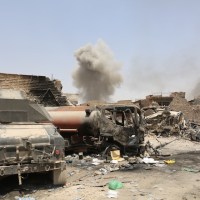We were in Mosul’s Old City over the weekend. The death and destruction are unfathomable. Dead bodies litter the streets. Officials estimate that up to 4,000 more may be trapped in the rubble of west Mosul. The majority of them are civilians—children, women, young and old people. Caught in a war that is not of their making.
An airstrike hit a few dozen meters away while we were filming an update at what remains of the al-Nuri mosque, where ISIS declared their so-called caliphate three years ago. You could hear the debris whizzing through the air. We got the tiniest taste of the terror, destruction, and carnage that people here have been living with for months.
The cost of this war against ISIS has largely been paid in civilian lives.
The final numbers may not be known for months, but it’s possible that more civilians have died in the battle for Mosul than military personnel or ISIS fighters.
But what’s truly shocking is the number of innocent people killed by U.S.-led Coalition airstrikes and bombings. We are killing these people. And the rate at which we are killing them has increased dramatically in recent months.
Researchers tracking the war against ISIS have observed a “sustained and unprecedented increase in civilian casualties caused by coalition airstrikes since January.”
During his campaign, President Trump promised to “bomb the **** out of [ISIS],” and he seems to be making good on that promise. One commander in Mosul’s Old City estimates that over the last few days, Iraqi forces have called in 20 airstrikes per day, including the one our team was caught up in. All this, in an area just over half a square mile in size.
And, on one level, it the tactic seems to be working. Coalition forces are making great progress in taking back Mosul. But at what cost? Hundreds, if not thousands, of innocent people have lost their lives. The very same people we claim to be helping.

Between January and May, there were 30% more civilians deaths from coalition airstrikes in Iraq and Syria than all of 2016. In some instances, entire families have been killed in strikes targeting one or two ISIS fighters.

Some of this increase may be because Coalition forces are dropping more bombs—hitting 1,577 targets in May alone, a 55% increase from April.
May wasn’t even the worst month for civilian casualties. That was March, when 257 civilians were killed in Raqqa and when a home full of innocent families was targeted in Mosul, killing more than 100.
According to researchers tracking civilian deaths in Iraq and Syria, “The unprecedented increase in fatalities from Coalition actions [may be] related to an undisclosed change in the rules of engagement or offensive procedures on the battlefield.”
Some of those killed are the very same people for whom the U.S. is declining to offer safe-haven, following the suspension of the refugee program as part of President Trump’s travel ban, implemented last week. One of the reasons our political leaders say we’re fighting ISIS is to make countries like Iraq safer so their people don’t have to seek refuge elsewhere. But in the process, we’re making it even more dangerous for them.
We drop more and more bombs on them while refusing to grant them safety on our shores. We create more and more refugees while refusing to take any of them in.
“Loving your neighbor doesn’t mean leaving the front door unlocked.” This argument is sometimes used to support tighter refugee policies. And while it may be a valid point, that’s not what this is. This is more like going into someone’s home, lighting it on fire, and locking the door from the outside on your way out.
ISIS needs to be defeated. And war is always messy and tragic and complicated, no matter how necessary we think it might be.
But if we refuse to take any refugees out of fear for our civilians’ safety, shouldn’t we show the same concern and restraint when it comes to the safety of civilians in Iraq and Syria when ordering airstrikes?
If we are willing to tolerate an increase in “collateral damage” in order to help Iraq defeat ISIS, shouldn’t we be willing to tolerate a slight increase in our personal risk in order to help solve the global refugee crisis?
Or do we value human life differently there than we do here? Do we value their lives less because they’re “over there” or because their skin is brown or because they worship differently?
If we are going to make vulnerable people stay in dangerous places, we must do everything in our power to make it safer for them. Just like we claim to be doing everything in our power to make our country safer for us.
The rules should not different for “us” and “them.” We must not prioritize the lives of Americans over the lives of others. Especially if we are the ones actively putting their lives in danger.
Some may say this is the cost of winning a war.
But for innocent people in Mosul, the cost is far too great.
We are all human and all of our humanity ought to be respected. Whether that is through our refugee and immigration policies or in our rules of engagement during conflict.




